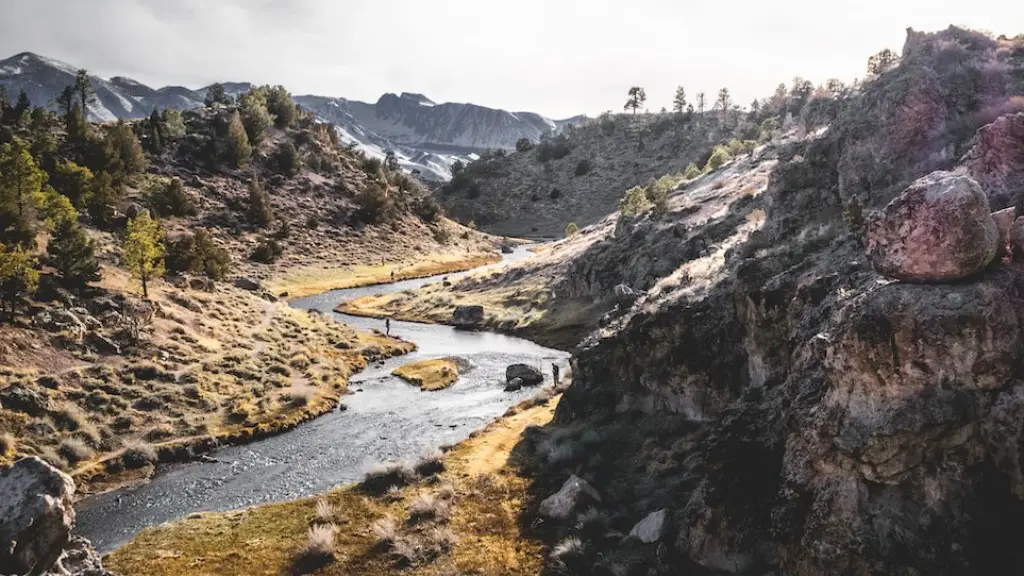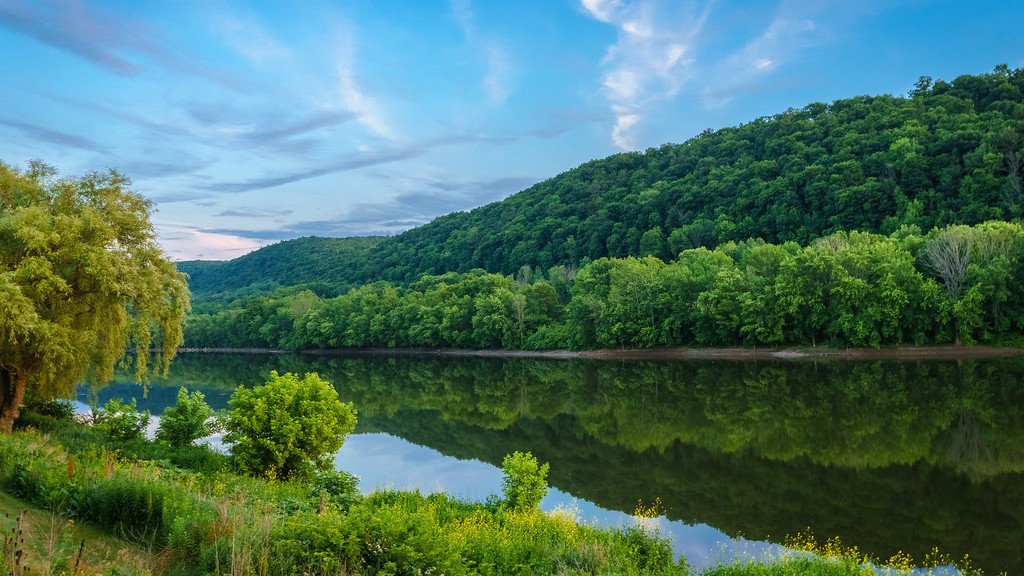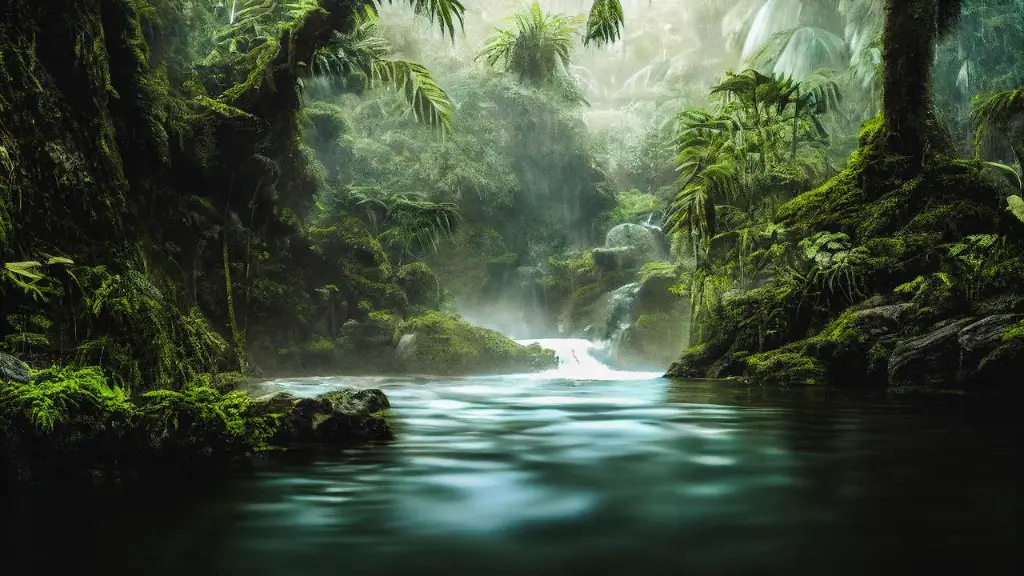Ecological Benefits
The Mississippi River plays an important role in sustaining various species of wildlife. Hundreds of bird species, invertebrates and fish that populate the river banks and its waters rely on the river’s healthy and well-maintained ecosystems. Taking into account the need to maintain a balance between human activity and the environment, the conservation of the Mississippi River is a must. This will lead to an increase in the populations of fish, birds, mammals, and all other kinds of life.
The abundance of aquatic life in and around the Mississippi also plays an important role in the livelihoods of local fishermen. Not only are they able to rely on the river’s amazing fish stocks, but it often serves as a source of tourist income. With its fantastic scenery and rich natural resources, people from all around the nation come to fish in the Mississippi River and its tributaries.
Historical Value
The Mississippi River is one of the most historically significant rivers in the United States. Early explorers like Henry Schoolcraft and Meriwether Lewis explored its banks and discovered the cultures that inhabited its waters. It is also a national landmark for the transportation of goods and supplies for the booming agricultural industry.
The Mississippi was integral in the Civil War battles and it is associated with legendary figures like the riverboat captain Mark Twain. This vast body of water was also a major migratory route for those seeking to start a new life in the Midwest and California during the 19th century. This symbol of liberty and freedom played a major role in the establishment of new settlements, many of which still remain as bustling towns and cities today.
Economic Benefits
The Mississippi River is a major economic artery in the Midwest, providing jobs and income to people along its banks. There are several major ports that operate along the river, making it an important site for hundreds of businesses related to shipping and receiving goods. Agriculture is also a key component of the economy of the Mississippi River. It provides the necessary resources for farmers in the region, from fertilizers and irrigation to the transport of crops to their distant markets.
Tourism is yet another sector that relies on the Mississippi River. The “Mighty Mississippi” draws millions of tourist dollars each year, making it a major contributor to the regions’ economies. Boats and ships take people deep into the river’s heart to explore its beauty, while many tourist-friendly infrastructure opportunities spread throughout its banks.
Cultural Benefits
The Mississippi River is an invaluable cultural resource for people along its banks. For generations, the culture of the river has been passed down in the form of stories, music, and arts. This is an important way for people to preserve their identity and keep their heritage alive.
Not only does the river’s culture serve as a great source of pride for the locals, but it has also been shaped by the many different people that have used the river. Whether it be for transportation, fishing, or recreation – the culture of the Mississippi River has always been enriched by its human inhabitants.
Environmental Benefits
The Mississippi River is a critical part of the environment and its importance cannot be overstated. It helps to control floods, provides habitats for several species of flora and fauna, and serves as a source of clean water. Its presence has been a source of strength and nourishment to the region for centuries.
The river helps to filter out toxins and pollutants in the environment. This helps to reduce water contamination and limit the negative effects of human activities on the environment. Its presence has also been a strong source of biodiversity, helping to keep nature in balance.
Education Opportunities
The Mississippi River opens up a world of learning opportunities for students and adults alike. From field trips and educational seminars to lectures and volunteer opportunities, the Mississippi can be a great way for individuals to gain knowledge about the region and its culture.
Various organizations offer workshops that focus on sustainable development and environmental protection, so students can gain an understanding of how their actions can impact the region’s ecosystems. Through the river itself, local groups host river cleanups, teach boating and swimming safety, and promote responsible fishing practices.
Archaeological Discoveries
The Mississippi River can also be a great source of archaeological discoveries. Numerous artifacts have been found in the river and its tributaries, providing a window into the region’s ancient past. From ancient pottery and tools to remnants of ancient cultures, the Mississippi’s banks reveal a vast amount of history.
The river’s boundaries are home to several ancient burial mounds that date back to the Pre-Columbian era. These mounds have been studied by archaeologists, providing a greater insight into the customs and beliefs of Native Americans.
Since the beginning of steamboats, the Mississippi River has been an essential transportation route for goods, whether it be for shipping heavy goods or people travelling by ferry. Despite its unpredictable curves, the river has provided an easy route connecting cities to each other.
The modern era has seen the Mississippi River utilized for transportation in more efficient ways. From the barges and ferries lined up along its banks to the ships that traverse its waters, the river provides a fast and cost-effective manner for transporting goods across vast distances.
Recreational Opportunities
If you’re looking to enjoy the beauty of the Mississippi River, there’s no shortage of recreational opportunities. Visitors can take part in a variety of water sport activities such as tubing, kayaking, and boating. There are also several riverside parks that offer camping, fishing, and hiking options.
The banks of the Mississippi provide an awe-inspiring experience for all. From hot summer days spent lounging by the river to the brilliant fall colors of its changing leaves, the Mississippi River is an incredible place to experience nature in its rawest form.
Protection & Preservation
The amazing natural beauty of the Mississippi River is worth preserving for future generations. To ensure the preservation of its ecosystems, riverbanks, and tributaries, several conservation organizations are working together to keep the river healthy.
Organizations like the Mississippi River Basin Alliance and the Mississippi River Enchancement Corporation are working to combat harmful human activities such as pollution and over-fishing. Their efforts will go a long way in protecting the integrity of the Mississippi River and ensuring it continues to be a vital resource for future generations.
Opportunities for Tourism
The Mississippi River provides a multitude of opportunities for tourism. Cruise and riverboat tours are a popular way to experience the beauty of the river, with scenic views of its towns, plantations, and forests. Many dock facilities also offer merchant shops, live entertainment and other activities that showcase the local culture.
The Mississippi River also provides ideal conditions for adventure sports, such as canoeing and kayaking. There are a variety of guided trips for all skill levels that provide an exciting way to discover the region. Hotels, restaurants, and even a few amusement parks dot the banks of the river and contribute to local businesses, attractions, and communities.
Endless Possibilities
The Mississippi River has been an integral part of the nation’s past, but its future remains to be seen. As the region continues to grow and adapt to changing times, the river provides countless possibilities for its inhabitants. With its vast resources and seemingly limitless potential, the Mississippi River is sure to provide many opportunities for years to come.



